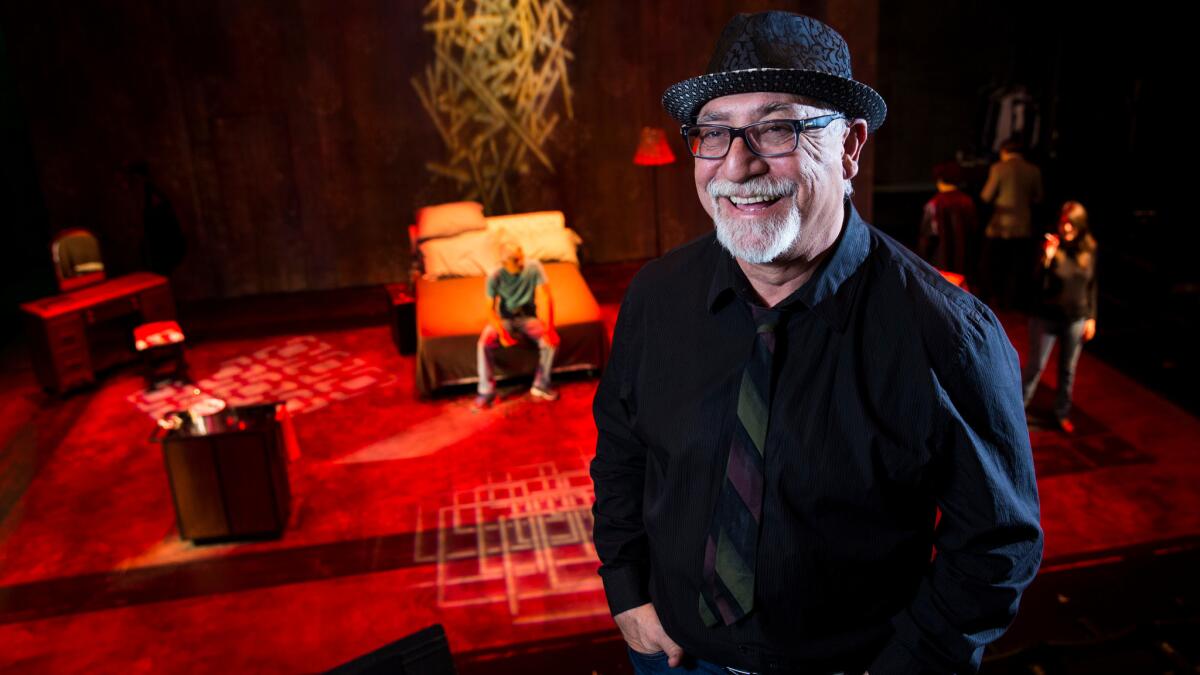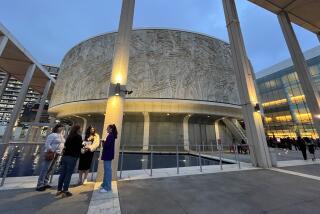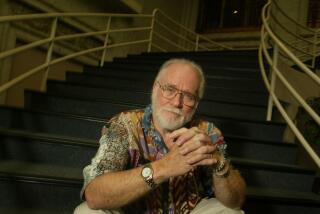Q&A: With $500,000 grant, what’s next for downtown L.A.’s Latino Theater Company?

Independent theater companies may come and go, but L.A.’s Latino Theater Company has stayed alive since its founding in 1985 by Artistic Director José Luis Valenzuela. It’s one of a just a few local theater companies established in the 1980s that has prevailed.
The company, dedicated to the advancement of Latino theater in the United States as well as to the creative employment of all people of color, has mounted productions such as the award-winning Mexican trilogy “Faith,” “Hope” and “Charity” by actress-playwright and founding member Evelina Fernández, “Calligraphy” (co-produced with Playwrights’ Arena) by Velina Hasu Houston and the experimental, Iraq war-themed “Melancholia,” which was collectively written as a company project.
In 2006, following a long and contentious competition with downtown developer Tom Gilmore, the Latino Theater Company was awarded a 20-year lease — along with a $4-million state grant — to operate the city-owned Los Angeles Theatre Center, a historic five-theater facility on Spring Street in downtown. In 2008, following extensive renovations on the venue, the Latino Theater Company produced its first full season at LATC.
Problems erupted in 2012 when the City Council voted to terminate the theater company’s lease along with that of its leasing partner, the Latino Museum of History, Art and Culture, because of “failed expectations.” (The theater company and the museum had been locked in a feud for years over lease payments.) Although the museum ultimately vacated the premises, the Latino Theater Company worked with the city to update the lease.
Last month, the Latino Theater Company received a $500,000 grant from the Andrew W. Mellon Foundation to bolster the organization’s systems and operations.
Valenzuela, who is also a film and stage director, spoke recently about the theater company for this conversation, edited for length.
How did the Mellon Foundation grant come about?
It’s been an ongoing conversation and relationship for the last three to four years. The foundation first gave us a grant in 2014 for $89,000 to support the artistic director fellowship we were awarding as part of our “Encuentro” (Encounter) festival [which assembled 150 artists from theater companies nationwide to perform 17 plays in a month]. It was a very successful program, so the foundation was excited to support the organization again.
The theater’s announcement said the grant money would be used to “expand and professionalize” your staff. Could you be more specific?
We will now be able to add a marketing director and a development director as well as hire a new managing director.
The marketing director will help with institutional marketing and a strategic marketing plan for the next five years. The new general manager will work in partnership with our board and the artistic director to ensure the future of the center within a new global culture and environment.
What’s your feeling about the state of Los Angeles theater these days?
I love L.A., of course, and I love the theater in L.A. But unfortunately, I don’t think theater in Los Angeles gets respected — even in Los Angeles. I think there are a lot of very talented, very committed theater people here. It’s astounding why we can’t compete with a lot of other theater people in the rest of the country.
Los Angeles, specifically, does not have a lot of funding sources for theater, especially for the midsize houses.
Versus New York or Chicago?
Of course. Very different than New York. Very different from Chicago. Chicago is fairly well-funded for the midsize theater. Chicago is also very proud of their theater community and very united about what theater means for that city.
Still, I feel like there are a lot of people interested in Los Angeles theater that really want to promote the understanding that it’s important to the city.
I think people of color and the smaller theater companies are going to have a really hard time if the proposed changes to Actors’ Equity’s 99-seat plan [instituting minimum pay requirements] become a reality.
How do you see your company’s place within the Los Angeles theater world?
Most important is that we are an independent company and that we’ve been able to survive doing theater for the last 30 years. It’s extra important since our mission is to give opportunities not only to Latinos but to other communities of color as well as to smaller theater companies that need production support and exposure.
See the most-read stories in Entertainment this hour >>
How do you choose your productions?
Because L.A. is so diverse culturally, and because our audience is so culturally diverse, the theater that we do has to represent more global concerns and discussions.
So we are looking for young writers who have an interesting voice and young theater companies that are interested in being part of our organization.
Let’s talk about the Los Angeles Theatre Center. How are its performance spaces [three midsize auditoriums and a smaller black box theater and “creative space”] used?
The Latino Theater Company usually does four to five plays per season, one season in the spring and one in the fall. Out of each season, two of the plays are Equity productions and two are produced in the small house [under the 99-seat plan].
And the rest of the time? Outside rentals?
Yes. These rentals usually come to the small theater. The bigger theater rentals are usually only for a weekend [for one-off presentations].
So then much of the time the theater is not operating at capacity?
That’s right.
As manager of the LATC, is it your responsibility to keep all of the houses rented?
Yes, it is. The theaters are sometimes used for dance productions, panels and youth festivals. We try to find things that are compatible to our audience or compatible with what we think our future should be.
Has the downtown resurgence these past years helped?
This is something that we’re always talking about. It’s helped a lot. People were fearful to come to this part of town for many, many years. But now, not as much.
At the same time, the populations that live [downtown] or are moving in are slowly getting acclimated to what the cultural life is going to be for them. We have great cafes and great restaurants and great bars, but I think they are still tentative about seeing theater as part of their cultural life.
Are you saying you need to get the millennials on board?
Exactly. It’s not in their DNA yet.
What else is in the works for the Latino Theater Company?
So much. We are creating a new relationship with seven Los Angeles playwrights that’s called the Temblors Initiative. We’re producing their plays in Equity houses, one to two [world premiere] plays a year over four years. It’s a wonderful, very diverse group of playwrights.
This fall, we will be presenting “A Mexican Trilogy” in its entirety for the first time. And next fall, we’ll be returning to our “Encuentro” program with “Encuentro de Las Americas” (Encounter of the Americas), which is going to include Canada, the United States, South and Central America. I’m very excited about it.
Follow The Times’ arts team @culturemonster.
MORE ENTERTAINMENT NEWS
Late-night hosts have a field day with Melania Trump’s, ahem, unoriginal speech
Lady Gaga asks fans to ‘root us on’ while she and Taylor Kinney are ‘taking a break’
Record label PC Music pushes the boundaries of pop music with a new sound
More to Read
The biggest entertainment stories
Get our big stories about Hollywood, film, television, music, arts, culture and more right in your inbox as soon as they publish.
You may occasionally receive promotional content from the Los Angeles Times.






